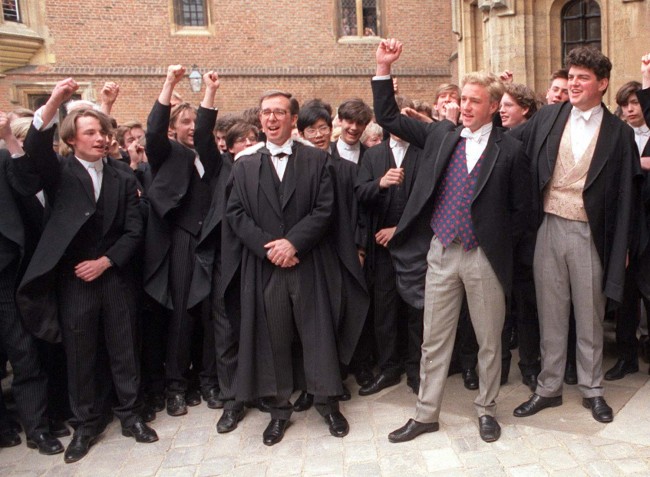State Schools Are Only For The Poorest Lawyers, Doctors And Teachers

Pupils at Eton School cheering The Queen
Andrew Halls, headmaster of King’s College School in Wimbledon (fees per annum: £20,000 plus extras) a year, has a warning:
“We have allowed the apparently endless queue of wealthy families from across the world knocking at our doors to blind us to a simple truth: we charge too much… The most prestigious schools in the world teach the children of the very wealthiest families in the world. A typical boarding school now requires a parent to have a spare £30,000 in taxed income to pay for just one child — every year.
“We are in danger of coming across as greedy, because we can charge what appears to be limitless fees but in truth there is a fees timebomb ticking away. It feels like the build-up to the banking crisis. For the first time in my career, I feel that the shifts over the next 10 years could prove seismic.”
These schools are businesses. They charge what they can get.
One odd line comes at the start of the Sunday Times’ report:
Fee-paying schools have become so expensive that lawyers, doctors and teachers can no longer afford to educate their children privately, with some becoming little more than “finishing schools for the children of oligarchs”, according to a headmaster at one of the country’s top independent schools.
How much do teachers earn. The Department of Education notes:
At a minimum of £22,023 (or £27,543 in inner London), the starting salary in teaching is high compared to other graduate starting salaries. Leading practitioners can earn up to £65,324 in London and £58,096 outside London, while head teachers can reach a salary of between £42,232 and £114,437.
Most firms operate a system where trainees spend six four-month periods in different departments, such as crime, personal injury, corporate, property, litigation and private client. The minimum salary for trainee solicitors in central London is £18,420 (£16,500 elsewhere) but that rises considerably in the City, where first-year trainees can receive £28,000 to £41,000
That can lead to salaries of beween £100,000 and £1m plus a year.
And medcia in the NHS:
In the most junior hospital trainee post (Foundation Year 1) the basic starting salary is £22,636. This increases in Foundation Year 2 to £28,076. For a doctor in specialist training the basic starting salary is £30,002. If the doctor is contracted to work more than 40 hours and/or to work outside 7am-7pm Monday to Friday, they will receive an additional supplement which will normally be between 20% and 50% of basic salary. This supplement is based on the extra hours worked above a 40 hour standard working week and the intensity of the work.
Doctors in the specialty doctor grade earn a basic salary of between £37,176 and £69,325.
Consultants can earn a basic salary of between £75,249 and £101,451 per year, dependent on length of service. Local and national clinical excellence awards may be awarded subject to meeting the necessary criteria.
So. Lawyers, doctors and teachers could afford fees at top independent schools.
And things are looking rosey for Kings the brand, now billed as the Sunday Times indy school of the year:
King’s College School plans to open 10 schools in China over the next 20 years to prepare children for study at top British and American universities, including Oxford and Cambridge. Chinese children will pay £12,000 a year while expats will be charged £20,000 for a place.
So. The Chinese get a discount for a famously sound British education. The brand goes global.
But is it worth tge money?
Private-school pupils are more likely than their state-educated peers to get better exam results. Why? Well teaching helps. Just 45 per cent of state-school maths teachers have a maths degree compared to 70 per cent in the private sector. Parents are willing to pay for their children to be taught by teachers passionate about their speciality and free to teach what they are best at. To compete, State schools don’t only need to match private school pay (it’s higher at fee paying schools) but allow teachers to stick to their chosen fields without being made to be jacks of all trades…
Posted: 23rd, November 2014 | In: Reviews Comment | TrackBack | Permalink


